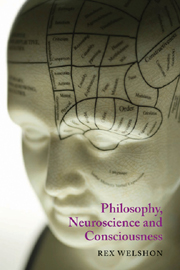Book contents
- Frontmatter
- Contents
- Preface
- Introduction
- PART I PHILOSOPHY AND CONSCIOUSNESS
- 1 Consciousness and conscious properties
- 2 Identity, supervenience, reduction and emergence
- 3 Reductive and non-reductive physicalisms
- 4 Representationalist theories of conscious properties
- PART II NEUROSCIENCE AND CONSCIOUSNESS
- PART III PHILOSOPHY, NEUROSCIENCE AND CONSCIOUSNESS
- Concluding semi-scientific postscript
- Appendix Functional neuroanatomy
- Notes
- Bibliography
- Index
1 - Consciousness and conscious properties
from PART I - PHILOSOPHY AND CONSCIOUSNESS
- Frontmatter
- Contents
- Preface
- Introduction
- PART I PHILOSOPHY AND CONSCIOUSNESS
- 1 Consciousness and conscious properties
- 2 Identity, supervenience, reduction and emergence
- 3 Reductive and non-reductive physicalisms
- 4 Representationalist theories of conscious properties
- PART II NEUROSCIENCE AND CONSCIOUSNESS
- PART III PHILOSOPHY, NEUROSCIENCE AND CONSCIOUSNESS
- Concluding semi-scientific postscript
- Appendix Functional neuroanatomy
- Notes
- Bibliography
- Index
Summary
Our topics are consciousness, its properties, what neuroscience has to say about them, and whether what neuroscience has to say about them is enough to warrant reducing conscious properties and events to neural assemblies, their activities and their properties. A psychological state, process, or event is conscious in the full sense of the term whenever it is intentionally structured, qualitatively endowed and subjectively perspectival or, more pedantically, whenever it has the properties of being intentionally structured, qualitatively endowed and subjectively perspectival. As so understood, a conscious event is complex, for it is a set of properties instantiated by a psychological event, state or process. Since it is a set of properties that are instantiated when a psychological event, state or process is conscious, any such event, state or process that has deficits to one or more of these properties is compromised. Neuroscience confirms the existence of compromised conscious events, states and processes.
In this first chapter, we begin the process of untangling the knots posed by consciousness and its properties by trying to appreciate why intentionality, qualitative character and subjective perspectivity are so confounding, to understand what these properties are, and to clarify some of the ways the terms “conscious” “unconscious” and “subconscious” are used in contemporary neuroscience and philosophy. In subsequent chapters, we discuss in a philosophical environment the nature of various candidate relations between conscious events and their properties, and neural processes and their properties. We then turn to evidence that there are neural correlates of conscious properties. In the final four chapters, that evidence is assessed from a philosophical perspective.
- Type
- Chapter
- Information
- Philosophy, Neuroscience and Consciousness , pp. 6 - 30Publisher: Acumen PublishingPrint publication year: 2010



